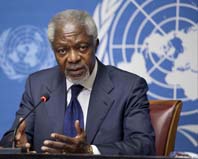
|
Chapter 8
UNITED NATIONS— Since 1945 the United Nations has been, directly or indirectly, part of the lives of virtually everyone on earth. Its mission is to meet the needs of all humanity for global peace, security, justice, human dignity, equality, and universal human rights. These aspirations of the human spirit have never been realized before by mankind. The ruling powers had failed to find the path to world peace during the horrors of the twentieth century. After the scourges of the First and Second World Wars, and after Hiroshima, it was clear that mankind had only one more chance. Mankind must stop its continuing warfare, and sow the seeds of peace to prevent future wars. We must destroy the threat of nuclear warfare, or it will destroy us. Long before World War Two it was clear that a new international organization of world states was needed. The League of Nations had failed, but collective security was still the only feasible option to secure peace for all peoples. At a meeting in London in 1941, leaders of countries occupied by Hitler signed an Inter-Allied Declaration to “work together, and with other free peoples, both in war and peace,” toward worldwide social and economic security. U.S. President Roosevelt and Great Britain’s (now legally the United Kingdom) Prime Minister Churchill signed the Atlantic Charter in 1941, pledging mutual support and for “a peace which will afford all nations safety and freedom from fear and want.” On January 1, 1942, twentysix nations signed the Declaration of the United Nations. In 1945, fifty-one nations met for two months in San Francisco, where they debated and signed the Charter of the United Nations—to “save succeeding generations from the scourge of war,” “reaffirm faith in fundamental human rights,” “establish conditions under which . . . international law can be maintained,” and “promote social progress.” The first sessions of the General Assembly and the Security Council were held in 1952. The primary body of the UN responsible for peace and security issues is the Security Council of five permanent members—the U.S., U.S.S.R., U.K., France, and China. Later, ten members were added, elected by the General Assembly and serving in rotation, normally for two years. The ten non-permanent members do not have the right of veto. Any nation, large or small, can refer a dispute to the Security Council. The Council can suggest terms of agreement, impose economic and diplomatic sanctions, or if necessary authorize military actions by troops from volunteering member states. These troops wear the uniforms of their countries, have blue helmets or berets, and may be armed with light weapons. The five permanent members of the Security Council each have a veto. This was necessary in 1945. Cordell Hull, U.S. Secretary of State, explained—“Unless the Great Powers agree, we cannot hope to have peace.” All members of the Security Council have used their veto powers from time to time. The U.S.S.R. used its veto power extensively, which effectively prevented vigorous action by the UN for many years. In 1950, the General Assembly was given the power to act on a “threat to peace” if the Security Council failed to do so. This has helped the UN negotiate around Council deadlocks on a number of occasions. The UN has six principal organs; the General Assembly, the Security Council, the Economic and Social Council, the Trusteeship Council, the International Court of Justice, and the Secretariat. The General Assembly represents every UN member state, with each having one vote. Decisions on important matters require a two-thirds majority—on other matters only a simple majority. This gave the same voting power to a state of 100,000 people (Tonga) and of 281 million (U.S.), resulting in prolonged debate and delay among the 191 members jockeying to build a block of supporters. Often decisions were too little, too late, without the substance worthy of a world organization, or defeated for political reasons. No organization is perfect under all circumstances, and many recommendations have been made over the years to make both the General Assembly and the Security Council more democratic and effective. The most important job of the UN is to keep the peace. This now requires four major functions: removing basic causes of war; solving immediate disputes; working on long-range problems such as nuclear control disarmament; and after September 11, 2001, the elimination of world terrorist organizations such as al-Qaeda, led by Osama bin Laden, a Saudi Arabian. With the winding down of the Cold War in the mid 1980s by Ronald Reagan, U.S. President, and Chairman Gorbachev of the U.S.S.R., the UN was able to become more active in both peacemaking and peacekeeping. Peacemaking has included authorizing a UN alliance to fight major wars launched by aggressor nations, such as the Korean War in 1950 and the Gulf War in 1991. Peacemaking also includes enabling the international community to remove both the root causes and the short-term causes of war, and to act to defuse violent hostilities before armed hostility erupts. Peacekeeping includes sending observer missions to gather information on hostilities, securing and maintaining cease-fire agreements, and being treaty negotiation advisers. When peacekeeping failed, as during the genocide in Rwanda, it was often because there was no peace to keep. The UN has had extensive experience in dealing with all the issues that are precipitating causes of war. For example, in 1954, Thailand, experiencing unrest following a political coup d’état, asked for UN observers as a protection against war. If the disputing countries cannot find a peaceful solution, the UN can suggest terms of agreement and send in experienced arbitrators. The UN has been given authority under the Charter to authorize UN members to defeat invasion of a member state, and to take action both to prevent the outbreak of armed hostility and, if necessary, to authorize policing actions by peacekeeper units from member states, armed with light defensive weapons, to act as a buffer to keep armed fighting to a minimum until a ceasefire can be secured and maintained.
|
|||
 |
|||
|
“The epidemic of world lawlessness is spreading. When an epidemic of physical disease starts to spread, the community approves and joins in a quarantine of the patients in order to protect the health of the community against the spread of the disease.”
President F. D. Roosevelt Speech—Chicago, 1937
|
|||
 |
|||